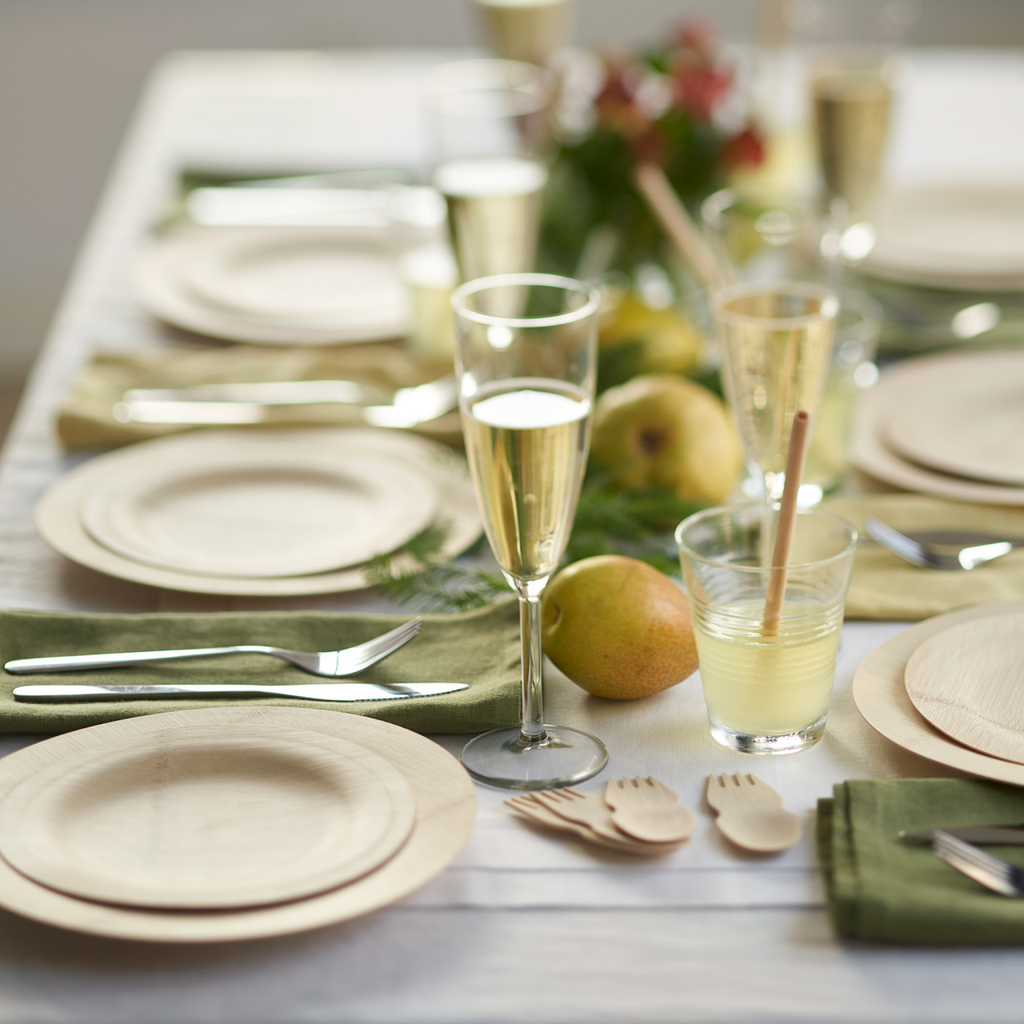Transitioning your life to be as low-impact as possible can feel like a daunting task. So why not take it one room at a time? The kitchen is home to many daily routines with a big environmental impact. And these eco-friendly kitchen tips can help you make each day a little greener.
Living sustainably doesn’t require a giant overhaul of your life. In fact, it’s often simpler than you think (like making a change to eco-friendly kitchen utensils). If you’re not sure where to start, use these tips to make your home greener. Whether you’re dipping your toe into greener waters or going fully zero-waste, working towards a sustainable kitchen is a great place to focus your energy.
10 Eco-Friendly Kitchen Tips You Can Use Today
How do you make a green kitchen a reality? Start small with these eco-friendly ideas, and before you know it, your sustainable goals will be met!
1. Choose to reuse your “imperfect” items
Not ready to buy all-new, plastic-free storage containers? Still have takeout chopsticks in your drawer from your last Chinese food night? Rather than tossing out the not-so-sustainable items you already have, make them last. Wash and reuse your takeout chopsticks for a second or third time. Have plastic bags from the grocery store? Repurpose them as small trash bags for your bathroom. Practicing imperfect sustainability will help you get the most out of the things you already have. After all, keeping things in use longer keeps them out of landfills. Once your imperfect items are no longer useable, look for reusable or biodegradable alternatives.
2. Take care of what you have
When you do purchase utensils and other tools that are made to last, make sure you care for them properly. Apply a food-safe oil to your wood or bamboo cutting boards and utensils. This monthly ritual can help these items last for decades. The same goes for pots and pans. Learn how to season your carbon steel or cast iron pieces, and you’ll never need to buy one again.
3. Make a meal plan, and stick to it
If you’re wondering, “how can I make my kitchen waste free?,” keep reading. Did you know that 30-40% of food in the United States goes to waste? And food waste isn’t just, well, wasteful. It’s also a big contributor to greenhouse gas emissions.
By making a weekly meal plan, you’ll be less likely to find yourself with rotten or excess food. This will lower your grocery bill and help save food from ending up in landfills. To double your impact, consider using a grocery service such as Imperfect Foods. They gather “ugly” produce that doesn’t meet grocery store standards and deliver it straight to your door.
4. Choose eco-friendly kitchen utensils
When it comes to both environmental and personal health, the utensils you use really matter. Plastic and silicone utensils are not biodegradable or recyclable. And, they can chip and crack, causing chemical-ridden particles to end up in your food.
Swapping these out for eco-friendly kitchen utensils, like ones made from organic bamboo, ensures your meal stays chemical-free. Not to mention that bamboo utensils will last years longer than plastic or silicone. And they’ll decompose into clean soil at the end of their life. Making a change to natural utensils is an affordable switch that will benefit you (and the planet) for years to come.
5. Store produce correctly to keep it fresh longer
Another way to combat food waste is by storing produce for maximum freshness. Store leafy greens and herbs upright in a jar with water. And beware of accidentally over-ripening fruits and vegetables by placing them next to produce that speeds up the ripening process.
6. Opt for reusable alternative to single-use items
While there’s no need for a massive shopping spree, slowing replacing the single-use items you use most with reusable solutions can save you money in the long run. Start with the things you use every day, like paper towels. Washable and reusable dishcloths are a long-lasting option that can be used for cleaning surfaces and mopping up messes.
7. Freeze your leftovers
If your leftovers often find their way into the back of your fridge, and then into the trash can, try a different approach. Freeze a meal portion of your next dinner, rather than putting it in the fridge. You’ll have more time to eat it without it going bad. And, the next time you need a quick dinner, you’ll have something tasty waiting.
8. Use the bulk section
Have you ever notice how much of your food comes in packaging of some sort? Even if you try to recycle, all that packaging waste adds up! So, the next time you head to the market, explore the bulk goods section. You’ll find grains, beans, and even baking ingredients, all packaging free. Scoop what you need into a reusable cloth bag, and transfer it to a tightly sealing glass jar at home. It’ll make your pantry look clean and organized, all while saving waste.
9. Switch to natural cleaners
Between dish soap, window cleaner, and countertop spray, a lot of different cleaning products make their way into your home. And many of them contain harmful chemicals. These can last forever in our water sources, and may be dangerous to your own health. Luckily, natural solutions are readily available, and they clean up messes just as well!
If you’re in the mood to DIY, try these simple mixes made with common household ingredients. Or, if you prefer a ready-to-use alternative, check out these uber-clean, hardworking products.
10. Ditch your disposable sponge
There are a lot of reasons to say goodbye to your green and yellow sponge. Studies show that the average disposable sponge is actually harboring more bacteria than your toilet. Gross, right? And from an sustainability perspective, disposable sponges are typically made from petroleum-based fibers that shed microplastics into our water sources. Plus, they need to be replaced every month or so, which leads to a lot of waste.
Choose a cleaner (in more mays than one) option. This reusable sponge is 100% plant based and plastic-free. And, it can be added to your next load of laundry or your dishwasher for easy cleaning.
Many lists of sustainable changes to make can leave you feeling overwhelmed and not sure where to start. But with these quick tips, you can begin the transition to a greener home today!
Did these eco-friendly kitchen tips leave you hungry for more waste-saving ideas? Check out these genius recipes that turn food scraps into fancy dishes! Or, start small by switching to eco-friendly kitchen utensils.





